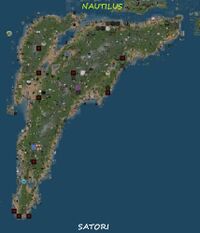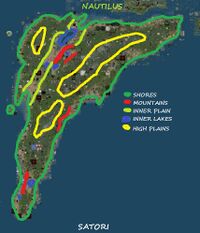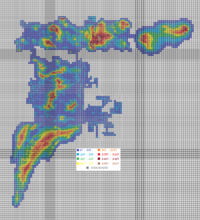Satori
Satori is a mainland continent. It was first created as a Japanese continent. Today, the population of this continent is worldwide and the most spoken language is English. This continent has many regions with Slavic-related names (many are Russian names). Their transcription in Latin alphabet can be very confusing for a person who is used with Cyrillic alphabet. Satori is linked to the north with Nautilus and to the northeast with the Blake Sea. The continent is made of a large mass of dry land. The road network is less developed and there are large places of abandoned land. Together with Nautilus, Satori forms a mega-continent, like Eurasia in the real world.
History
Construction of this continent started on February 21st, 2007. It was the first continent to be built in the east continental group. Construction ended on June 18th, 2007, a total of 86 days. Soon after its inauguration, work started on Nautilus.
Satori was connected to Nautilus by one of the Transcontinental Channels. After the creation of Nautilus City, it was completely linked and Nautilus - Satori supercontinent was formed.
Later, after the creation of Blake Sea, the northeast shore of Satori started to fall under Blake Sea economic influence. Parcels started to share the Blake Sea name and the local sea economy started to improve. There was a connection between the birth of Blake Sea and the creation of Nautilus City, as a strong connection to Nautilus[1].
Statistics
Size in regions: 709 (N-S 43, E-W 36)
Size in meters: 46.47 square km (11.01/9.22 km)
Sea regions (complete flooded): 26
Coast regions (water access): 205
Land regions (no water): 478
Regions with road access: 162
Regions with no direct access: 236
Coordinates
The Coordinates here are given in regions, following the same model used by Gridsurvey [2] for the position of every region. The numbers are: longitude (min - max) / latitude (min - max). There is no official geographic guide for Satori and there is a lack of geographical names, so the coordinates are given here for diverse areas of the continent. Some regions have Slavic names (including Russian) and form the Slavic area (note that these are only 30% of the region names). Also, the border with Nautilus is not clear.
Continent: 1100-1131 / 1005-1047
Slavic Region: 1113-1120 / 1030-1047
East Peninsula: 1121-1136 / 1031-1046
North-West Peninsula: 1101-1112 / 1039-1047
Central Landmass: 1100-1112 / 1030-1038
South Landmass: 1100-1120 / 1116-1130
South Peninsula: 1101-1108 / 1005-1115
Grid Sector: K10
Geography
Satori is formed of high plains or low hills, something between Gaeta 5 and Jeogeot. This plain can be divided into three regions: Main Plains, High Plains and Inner Plain. Satori has small mountain ranges and inner lakes and ocean covers some coastal regions.
The Main Plain covers 80% of the continental surface. It is not a smooth plain, however it doesn't form a coast (with little exceptions). The elevation rises from seaside (17 meters) to the inner high plains (100 meters) slowly, without forming valleys, hills or platforms. This is a much more spectacular altitude difference than Gaeta 5 but much lower than Jeogeot or Corsica. Various residents made several terraforming to their lands. These terraformings are the cause of multiple terraces, platforms, walls and holes.
The High Plains are plateaus at some distance to the shores. They have an elevation between 95 and 105 meters and look like large plains. They have a different ground texture, so are easy to recognise.
The Inner Plain is a long sandy depression that hosts some lakes near the center of the continent. Altitude is low. Sometimes, if you dig four meters you can find water. This plain has some lakes that are not deep. The mountain range separates a smaller similar depression to the east.
Mountains. Satori has only one mountain range, with a maximum height of about eighty meters. It separates the inner plains to west and another smaller depression to the east. They look a bit like the mountains of Jeogeot. The other mountains shown on the map are in fact plateau borders that look like hills. A tourist guide is available at Mountains Of East Continents.
The Inner Lakes are found in the inner plain (two, larger) and its eastern depression (two, smaller) and also in the south (one large and one small). They have the same elevation as the oceans, but are not connected with them.
Ocean Floor has a similar texture to Nautilus.
Altitude
Even if Satori looks like a compact continent on the geographic map, the Altitude map shows a process of fragmentation. Also, it shows overall smoothness of terrain and unexpected elevation. The most interesting aspect is the fragmentation and the presence of depressions.
The inner plain is a large depression that separates the continent into two main blocks. It has a low altitude and if one day the ocean level rose 15 meters, it will be flooded. Currently, parts of this plain are flooded. There are two gulfs at its border and inner lakes in its center. At a closer look, two small parallel mountain ranges (or hills) are visible in the southeast of the plain. There are lakes between the little mountains.
Other depressions are visible on the map. Satori has many endorheic lakes (see Water for more information). All lakes are at the same altitude with the ocean. Depressions that are higher than the sea level are not flooded.
The west part of the continent, separated by the inner plain, is smaller and has the maximum altitude of about 120 meters, similar to other high parts of the continent. It is fragmented into a main block and a smaller block in the northeast. It is as wide as the eastern part, but much shorter.
The eastern part of the continent is long. It has the same width from north to south. If we take away the west part, the continent will be much sharper in the north, as wide as it is now in the south. The highest place is in Anushka region, 128 meters, maximum altitude of all continents, but not much above the western part. Very interesting is that the the eastern part is further fragmented. There are small inner parallel depressions in the east and west. In the south, an endorheic lake separates the east part in two unequal blocks.
Altitude transition is smooth. Only on rare occasions does altitude change dramatically from one parcel to another. This is visible on the roads. All roads of Satori take turns and are unconstrainted by geographic obstacles to change their way. The most visible declivity is found in Bulyea region, with the most dangerous shore. A maximum altitude of 128 meters places Satori as one of the lowest Linden-owned continent.
Altitude map shows many similar features between Satori and Jeogeot.
Overall Considerations
Satori looks somehow similar to South America on the map. It is a relatively new continent, the same generation as Nautilus and Corsica. Many ground textures are common to these three continents. Since the construction of Nautilus city, Satori and Nautilus together form a supercontinent.
Population density is much higher near the coast. In regions without water access, population density is higher when there is a road nearby.
Transportation and accessibility
The roads of Satori don't provide access to all places. Many regions are isolated. The roads are not continuous. Sometimes they are interrupted by a lake and sometimes they simply do not exist in one region. There are teleporters that facilitate transportation through the gaps. This is fine for an avatar, but difficult for a vehicle. However, it is possible to walk across the whole continent on the parcels of abandoned land.
Navigation is possible along the coast (mainly in the north, where a boat can easy reach the shores of Nautilus) and for the land owners also in isolated endorheic lakes.
Air transportation is also important. Satori has its own airports.
Land With Restricted Access is rare. There are ban lines and entity orb teleporters, but their frequency is lower than on nearby Nautilus or Corsica. Satori looks like a good destination for flying.
Transportation efficiency
For more information, see Satori Network and Waterways.
Total road network: 26.77 km Conventional road: 26.04 km Path or trail (Old Wagon Road): 0.42 km Off-road: 0.31 km Unconnected roads: 3 pieces Sea access: No Land surface: 46.47 sq. km Coverage: 0.576 km of road per sq. km of land.
Road efficiency index: 0.415
Waterway efficiency index: 0.898
Total efficiency index: 1.313


